Two Women Discuss Little Women
I was talking to my friend Kathy today. It started when we discussed the piece I had written previously on friendship. Last night, I took flak from some other friends about it. Some thought I wrote it to seek closure on the issue, some that I was still plagued by what had happened, and I was faulted by one who said I had "not even said goodbye" but just walked away from the person. I pointed out when someone has just finished ripping you to shreds, "goodbye" isn't high on your priorities. Kathy immediately got at what I had been trying to do, however, which was write a piece comparable in style and quality to those that I had read in the book on friendship. Nothing more. A writing exercise. As I told the other friends: for the most part, when our friendships end, it is usually due to far more mundane reasons: marriage, children, geography, moving, interests. I wanted to see if I could write objectively about the subject.
It pleased me that Kathy zoomed right in and comprehended my mission, but she and I are in sync on so many things. While we were talking we shifted in topic to old movies, Leslie Howard as womanizer, and Little Women, the movie and book...oh yes, and monks. With her permission:
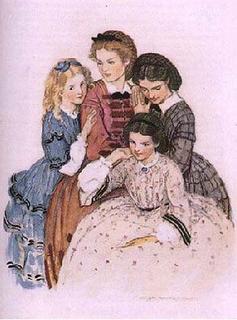
Cube: Little Women is on today at 4 on TCM. The June Allyson as Jo version.
Kathy: I liked that one, but I like the earlier one better, with Katharine Hepburn as Jo.
Cube: The Winona Ryder version got on my nerves. Oddly enough from me, I thought it took too much of a feminist slant which skewed the story line.
Kathy: That's what I heard...that it was "preachy." There is feminism in the book, but it has to be played authentically. I used to read and reread that book, and all of Alcott's* other books that followed* (Louise May Alcott, author).
Cube: I agree with you, and I did exactly the same thing. I still have my childhood copies of Little Women, Little Men, Roses in Bloom, Under the Lilacs, all of which I inherited.
Kathy: I think mine are at my parent's house. I wonder if they donated them?
Cube: All little girls wanted to be Jo. I wanted to be Amy.
Kathy: You're kidding. I hated Amy. Until she matured.
Cube: Bingo. It was her maturity and change that appealed to me.
Kathy: Yeah. I could see that.
Cube: Beth was too sweetly drippy, and Meg was boring.
Kathy: Really boring and too pliant, especially when she did the marriage thing. Blech.
Cube: I liked Jo until she hooked up with that old professor. He was a turn off to me. I thought she was trading her independence to lean on a man's shoulder.
Kathy: He never seemed real to me. Just another way to preach. I guess Alcott couldn't sell a woman character without a man.
Cube: Amy was a selfish brat early on in the book. What intrigued me was how through distance and grief her life completely altered. In retrospect, this was an odd observation for me to be making as a child.
Kathy: The change seemed too sudden, and her falling in love with Laurie seemed too sudden, but the book needed to move on.
Cube: Well, the whole thing seemed rushed at the end. What did you think of Marmee? She was too much for me. She never snapped at the girls. Total sacrifice.
Kathy: She seemed a little too saintly. I think Alcott was about creating the perfect family to balance her more bohemian, bluestocking family. Did any man ever read this book?
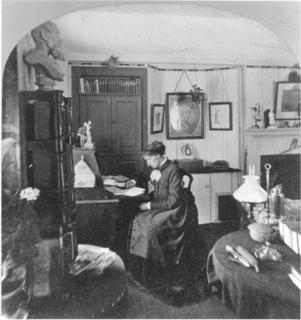 .....Louisa May Alcott in her writing room at Orchard House
.....Louisa May Alcott in her writing room at Orchard House
Cube: Good question. I would doubt it. Odd. I inherited all of these old children's books. I read Nancy Drew, Hardy Boys and Tom Swift as a child. The Nancy Drew's were all written in the 1930's and Nancy was always in a roadster with a rumble seat going to roadhouses and tea rooms. It all seemed so odd to me. Why do you think little girls read Little Women?
Kathy: Do they still read it? I don't know. I suppose it could be the maturation process. Each girl embodied some personality trait. For stronger female role models, there are better contemporary books. I always go to the American Association of Libraries web site to see what the award winning kid books are...just to see what's out there. If you look at that site, you'll know how old you are by seeing what the last book you read as a child by when it was published.
Cube: Little Women was published in 1869, just after the Civil War. I wonder what appeals to children about the book? Sisterly love? Family?
Kathy: I think it was family for me. Safety and security were important. I loved the period details.
Cube: It certainly seemed to be about Jo, Jo, Jo. She was Little Women's Marcia in the Brady Bunch. I looked at it's family aspect and interactions as well, and I didn't have sisters, so I suppose there was that fascination. Did you envy Jo her garrett? (the attic Jo went to escape and do her writing).
Kathy: Well, it was certainly romantic, but in reality gloomy and probably cold.
Cube: The whole "noble poverty" thing grated on me. When she asked her already sacrificing children to give up their miserly little Christmas breakfast to the German family, it seemed a bit much, even for Christian charity.
Kathy: How poor could they have really been? No new gloves and only one servant? Gee. Ain't it tough being the middle class. A lovely noblisse oblige gesture that didn't do much for the poor Germans, and what was Alcott's message there? Anti-immigrant? Useful plot point?
Cube: Well, that engagement of charity with the Germans ultimately killed her daughter. I do have favorite scenes that I love. Amy writing her will, when Beth is ill, making sacrifices of the mateial things that she loves. Jo running into Laurie in the street. He thinks she has a toothache, but she's really just submitted her stories. And I still love that scene of Amy in Europe, missing her family, knowing her sister is dying, alone and feeling her emotions as a full-formed adult, now, not the selfish girl. Also, Jo who stand so close to the fire she scores her dresses.
Louise May Alcott wrote about the March sisters, based on her own self and her sisters, and she gave the characters in Little Women her sister's characteristics:
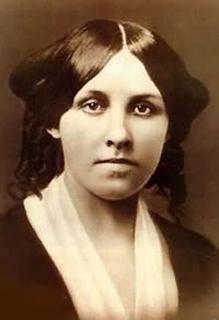
.....Louisa May Alcott was Jo
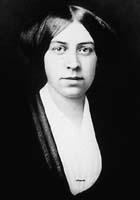
.....Anna Alcott was Meg
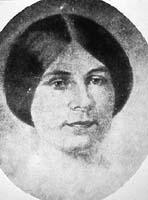 .....Elizabeth Alcott was Beth
.....Elizabeth Alcott was Beth
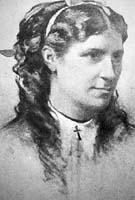 .....May Alcott was Amy
.....May Alcott was Amy
Kathy: The scorched dress was a wonderful visual moment. That and Jo cutting her hair to sell it for money for her father's care. More sacrifice. How short would it have been?
Cube: A few inches, probably, but remember back then all women's hair was long and their crowning glory. They had to wear it up, so it had to be long.
Kathy: One reason I liked that PBS show "1910 House" was for the same things in Little Women: the detail to life's labor. Hand-hemming sheets, muddy dress hems, hand washing clothes, no flushing toilets, all of the cooking on wood stoves. I see seminarians, and they walk around in their yard with the long white robes that haven't been hemmed properly, and they drag on the ground. And you know those pampered pups don't do their own laundry. So they don't care if the hem needs to be pretreated or scrubbed.
Cube: I know in the rectories of churchs, the priests always have a housekeeper. Some loyal older, widowed woman. Safe and totally dedicated to servant mentality.
Kathy: Whenever I say "Good morning" to them, they look right through me like they were raised in a barn. The priest who live there get their meals cooked for them, their apartments cleaned, clothes cleaned and pressed. They do nothing for their care.
Cube: (talking about Catholic row over by the Shrine) One time I was over there, walking on the sidewalk just before Trinity's chapel, and some seminarians were circling around the wall outside the chapel, entering it from the back, and they had on long white roped robes with hoods, with their heads bowed and hands folded inside their sleeves. I swear. In that one moment, it was like falling back into the Middle Ages, to see such a thing. What else can we say about Little Women? What about the father?
Kathy: There were no realistic male figures in the book. The father was distant. Mr. Lawrence was distant, for the most part, except when he gave the piano to Beth. Laurie was okay, I guess.
Cube: Laurie seemed rather submissive, looking for strong, dominant women in his life. He probably needed a Dominatrix.
Kathy: It was a strangely sexless book in comparison with Jane Eyre. No passion between the men and the women.
Cube: Despite the ragings of the Civil War going on in the South, she presented a rather contained world, but I guess we should remember the time frame she created it in.
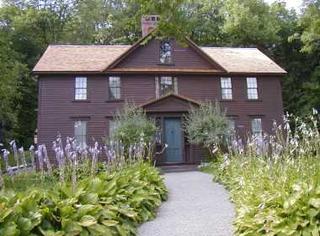
...Louisa May Alcott's family home,
Orchard House, Concord, Massachusetts
It pleased me that Kathy zoomed right in and comprehended my mission, but she and I are in sync on so many things. While we were talking we shifted in topic to old movies, Leslie Howard as womanizer, and Little Women, the movie and book...oh yes, and monks. With her permission:

Cube: Little Women is on today at 4 on TCM. The June Allyson as Jo version.
Kathy: I liked that one, but I like the earlier one better, with Katharine Hepburn as Jo.
Cube: The Winona Ryder version got on my nerves. Oddly enough from me, I thought it took too much of a feminist slant which skewed the story line.
Kathy: That's what I heard...that it was "preachy." There is feminism in the book, but it has to be played authentically. I used to read and reread that book, and all of Alcott's* other books that followed* (Louise May Alcott, author).
Cube: I agree with you, and I did exactly the same thing. I still have my childhood copies of Little Women, Little Men, Roses in Bloom, Under the Lilacs, all of which I inherited.
Kathy: I think mine are at my parent's house. I wonder if they donated them?
Cube: All little girls wanted to be Jo. I wanted to be Amy.
Kathy: You're kidding. I hated Amy. Until she matured.
Cube: Bingo. It was her maturity and change that appealed to me.
Kathy: Yeah. I could see that.
Cube: Beth was too sweetly drippy, and Meg was boring.
Kathy: Really boring and too pliant, especially when she did the marriage thing. Blech.
Cube: I liked Jo until she hooked up with that old professor. He was a turn off to me. I thought she was trading her independence to lean on a man's shoulder.
Kathy: He never seemed real to me. Just another way to preach. I guess Alcott couldn't sell a woman character without a man.
Cube: Amy was a selfish brat early on in the book. What intrigued me was how through distance and grief her life completely altered. In retrospect, this was an odd observation for me to be making as a child.
Kathy: The change seemed too sudden, and her falling in love with Laurie seemed too sudden, but the book needed to move on.
Cube: Well, the whole thing seemed rushed at the end. What did you think of Marmee? She was too much for me. She never snapped at the girls. Total sacrifice.
Kathy: She seemed a little too saintly. I think Alcott was about creating the perfect family to balance her more bohemian, bluestocking family. Did any man ever read this book?
 .....Louisa May Alcott in her writing room at Orchard House
.....Louisa May Alcott in her writing room at Orchard HouseCube: Good question. I would doubt it. Odd. I inherited all of these old children's books. I read Nancy Drew, Hardy Boys and Tom Swift as a child. The Nancy Drew's were all written in the 1930's and Nancy was always in a roadster with a rumble seat going to roadhouses and tea rooms. It all seemed so odd to me. Why do you think little girls read Little Women?
Kathy: Do they still read it? I don't know. I suppose it could be the maturation process. Each girl embodied some personality trait. For stronger female role models, there are better contemporary books. I always go to the American Association of Libraries web site to see what the award winning kid books are...just to see what's out there. If you look at that site, you'll know how old you are by seeing what the last book you read as a child by when it was published.
Cube: Little Women was published in 1869, just after the Civil War. I wonder what appeals to children about the book? Sisterly love? Family?
Kathy: I think it was family for me. Safety and security were important. I loved the period details.
Cube: It certainly seemed to be about Jo, Jo, Jo. She was Little Women's Marcia in the Brady Bunch. I looked at it's family aspect and interactions as well, and I didn't have sisters, so I suppose there was that fascination. Did you envy Jo her garrett? (the attic Jo went to escape and do her writing).
Kathy: Well, it was certainly romantic, but in reality gloomy and probably cold.
Cube: The whole "noble poverty" thing grated on me. When she asked her already sacrificing children to give up their miserly little Christmas breakfast to the German family, it seemed a bit much, even for Christian charity.
Kathy: How poor could they have really been? No new gloves and only one servant? Gee. Ain't it tough being the middle class. A lovely noblisse oblige gesture that didn't do much for the poor Germans, and what was Alcott's message there? Anti-immigrant? Useful plot point?
Cube: Well, that engagement of charity with the Germans ultimately killed her daughter. I do have favorite scenes that I love. Amy writing her will, when Beth is ill, making sacrifices of the mateial things that she loves. Jo running into Laurie in the street. He thinks she has a toothache, but she's really just submitted her stories. And I still love that scene of Amy in Europe, missing her family, knowing her sister is dying, alone and feeling her emotions as a full-formed adult, now, not the selfish girl. Also, Jo who stand so close to the fire she scores her dresses.
Louise May Alcott wrote about the March sisters, based on her own self and her sisters, and she gave the characters in Little Women her sister's characteristics:

.....Louisa May Alcott was Jo

.....Anna Alcott was Meg
 .....Elizabeth Alcott was Beth
.....Elizabeth Alcott was Beth .....May Alcott was Amy
.....May Alcott was AmyKathy: The scorched dress was a wonderful visual moment. That and Jo cutting her hair to sell it for money for her father's care. More sacrifice. How short would it have been?
Cube: A few inches, probably, but remember back then all women's hair was long and their crowning glory. They had to wear it up, so it had to be long.
Kathy: One reason I liked that PBS show "1910 House" was for the same things in Little Women: the detail to life's labor. Hand-hemming sheets, muddy dress hems, hand washing clothes, no flushing toilets, all of the cooking on wood stoves. I see seminarians, and they walk around in their yard with the long white robes that haven't been hemmed properly, and they drag on the ground. And you know those pampered pups don't do their own laundry. So they don't care if the hem needs to be pretreated or scrubbed.
Cube: I know in the rectories of churchs, the priests always have a housekeeper. Some loyal older, widowed woman. Safe and totally dedicated to servant mentality.
Kathy: Whenever I say "Good morning" to them, they look right through me like they were raised in a barn. The priest who live there get their meals cooked for them, their apartments cleaned, clothes cleaned and pressed. They do nothing for their care.
Cube: (talking about Catholic row over by the Shrine) One time I was over there, walking on the sidewalk just before Trinity's chapel, and some seminarians were circling around the wall outside the chapel, entering it from the back, and they had on long white roped robes with hoods, with their heads bowed and hands folded inside their sleeves. I swear. In that one moment, it was like falling back into the Middle Ages, to see such a thing. What else can we say about Little Women? What about the father?
Kathy: There were no realistic male figures in the book. The father was distant. Mr. Lawrence was distant, for the most part, except when he gave the piano to Beth. Laurie was okay, I guess.
Cube: Laurie seemed rather submissive, looking for strong, dominant women in his life. He probably needed a Dominatrix.
Kathy: It was a strangely sexless book in comparison with Jane Eyre. No passion between the men and the women.
Cube: Despite the ragings of the Civil War going on in the South, she presented a rather contained world, but I guess we should remember the time frame she created it in.

...Louisa May Alcott's family home,
Orchard House, Concord, Massachusetts



9 Comments:
Hey Cube, keep writin' and have fun, 1st Amendment or somethin', skew/screw the critics, and don't forget Harriet The Spy ...
Dave EE o
I looooooved Harriet the Spy. A wonderful slice of kid life. In a similar vein: "It's Like This, Cat". Great kid books for the 10 -- 12 set.
grince
I know this is completely out of left field, but I miss Tom Swift.
A lot.
Dave is calling me "Harriet the Spy," Grince. It's been a longstanding tease of his, and for readers, "no," my name is not Harriet. Now how do I redirect that NRO satellite over his house???
As for Tom Swift, what can I say? I loved them, too. I'm tempted to pull those books out of the case and read them again, now that they've been on my mind.
There is NOTHING like sitting down with a good book. Recently I read a "new" author/book - The Perks of Being a Wallflower. I normally like the "classics" best but I found it oddly wonderful and a great story.
Zzzzzzzzzzzzzzzz....I HATED "Little Women"....you just gave me bad nightmares from high school summer reading.
You amaze me, Phil. If I had to wager, it would be that no man had ever read Little Women. You may have hated it, but kudos to you for reading it.
I propose a reciprocal deal: men: please watch "All About Eve"; women: sit through "Platoon".
grince
Well....I didn't finish it.
Post a Comment
<< Home